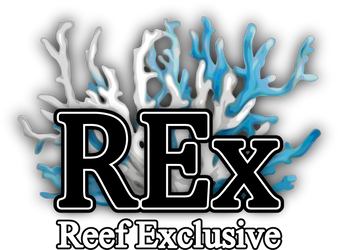
Professional Standards for Coral Care and Propagation at Reef Exclusive
Introduction
The marine aquarium industry holds itself to high standards of quality, led by companies like World Wide Corals, Top Shelf Aquatics, Corals.com, Aqua SD, and Tidal Gardens. At Reef Exclusive, we follow the same principles of care and quality—and in many ways, we go even further, applying tested methods and the latest technologies to ensure the health and beauty of every coral.
Our Approach to Coral Husbandry and Propagation
Maintaining Optimal Water Parameters
A stable aquatic environment is key. We maintain:
-
pH: 8.2–8.4
-
Alkalinity (KH): 7.7–8.5 dKH
-
Temperature: 73–75°F
-
Ammonia & Nitrites: Near zero
Stability matters more than hitting perfect numbers. Sudden swings are far more dangerous than slight variances.
Gas Exchange and Degassing
We ensure proper oxygenation and gas balance using:
-
High-efficiency protein skimmers with outdoor air intake
-
Strong water circulation between tanks and sumps
-
Wave makers to replicate natural ocean flow
-
Open tank surfaces for passive degassing
We eliminate dead spots that could lead to poor conditions.
Lighting System
Light is essential for coral photosynthesis. Our system includes:
-
Full-spectrum Orphek LEDs with tunable channels
-
Programmable lighting cycles that mimic the sun
-
Gradual acclimation of new corals to prevent light shock
-
PAR monitoring for precise light levels
Disease Prevention and Treatment
Quarantine Procedures
All new corals undergo a strict 7–14 day quarantine:
-
Visual inspection for disease and pests
-
Hydrogen peroxide and Coral RX dips
-
Isolation in controlled QT systems
-
Acclimation to display tank conditions
Infection Treatment
For conditions like Brown Jelly Disease, we use:
Pre-Treatment:
-
3% hydrogen peroxide dips (15–20 ml per 2L water)
-
Soak time: 5–10 minutes
-
Rinse before and after
Main Treatment:
-
Antibiotic dips (Amoxicillin / Metronidazole + Ciprofloxacin)
-
Chemiclean to combat cyanobacteria
-
Lugol’s iodine and tissue recovery additives
-
Soak time: 2–6 hours based on severity
Algae Management
Hair Algae Control
We prevent outbreaks by:
-
Strong biofiltration to reduce nutrients
-
Cleanup crew: Dolabella sea hares, Turbo and Trochus snails
-
Frequent water changes to remove organics
Valonia (Bubble Algae) Control
Our approach includes:
-
Better flow and filtration
-
Naso tangs (Naso elegans, Naso lituratus)
-
Reef-safe aquascaping to prevent detritus buildup
Bubble Scrubbing Technique
We regularly simulate natural reef cleansing by:
-
Saturating water with microbubbles 2–3 times/week
-
Each session lasting 2–3 minutes
-
Promoting coral mucus shedding for detox
This mimics natural events like tides and storms.
Coral Fragmentation and Recovery
Preparing Mother Colonies
We only frag:
-
Colonies at least 2 months old
-
Specimens showing strong growth and coloration
-
Healthy sizes that allow safe fragging
The Fragging Process
-
Use of specialized tools: coral cutters, diamond saws
-
Clean, fast cutting
-
Immediate antibacterial treatment of cut sites
-
Transfer to dedicated recovery systems
Healing and Recovery
-
Lower light levels for 3–5 days
-
Moderate flow to prevent damage
-
Daily tissue inspections
-
Preventative dips at any sign of infection
Quality Control and Monitoring
24/7 Monitoring
We continuously track:
-
pH, temperature, salinity (automated sensors)
-
Daily tests for nitrates, phosphates, calcium, magnesium
-
Weekly full-panel testing
-
Record-keeping for all parameters
Coral Photo Documentation
Every coral is photographed under:
-
White light – health assessment
-
Actinic light – to show fluorescence
-
Mixed lighting – true-to-life color
Environmental Responsibility
Sustainable Aquaculture
We prioritize:
-
Over 60% of our corals are aquacultured
-
Maintaining genetic diversity
-
Waste reduction via advanced filtration and recycling
-
Educational outreach to raise environmental awareness
Scientific Support
We actively collaborate with marine researchers and support coral reef conservation efforts.
Conclusion
At Reef Exclusive, our standards reflect both experience and passion.
Like the most respected names in the hobby, we know that coral farming requires a comprehensive approach—stable conditions, disease prevention, smart propagation, and ongoing education.
Our goal isn’t just to sell corals.
We want to equip reef keepers with the knowledge and quality to build thriving ecosystems at home.
Every coral that leaves our systems carries with it the care, expertise, and dedication that define true professionals in reef aquaculture
